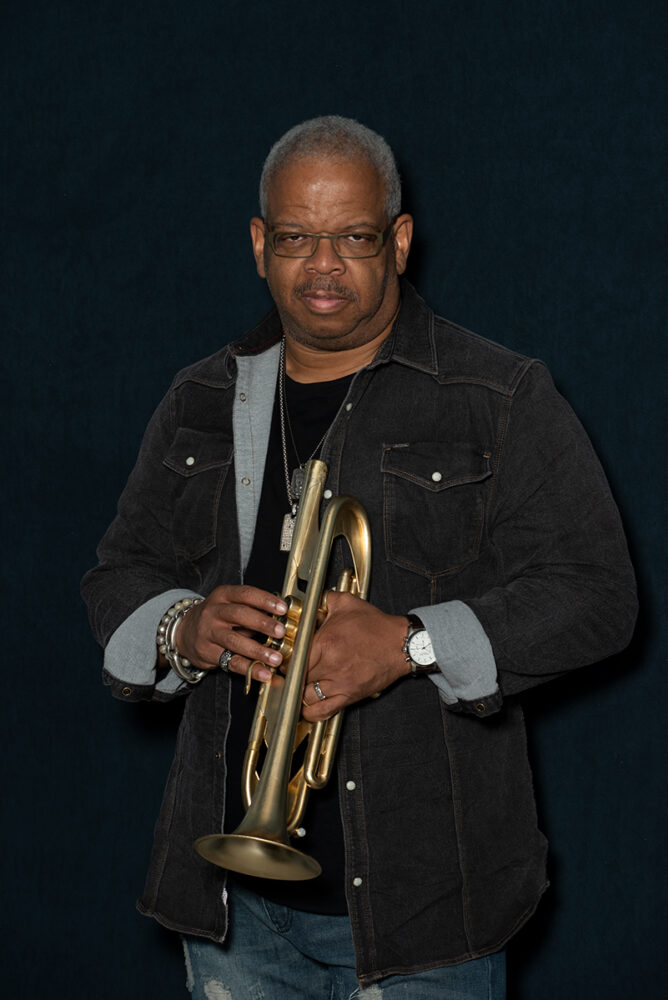Terence Blanchard
New Orleans–native Terence Blanchard is a multi-Grammy-winning, twice Oscar-nominated jazz trumpeter, composer, and educator.

Louisiana Endowment for the Humanities
Terence Blanchard. Photo by Eric Waters
Terence Blanchard is a multi-Grammy-winning, twice Oscar-nominated jazz trumpeter, composer, and educator from New Orleans. In 2021 his second opera, Fire Shut Up in My Bones, became the first opera by an African American composer to be staged by the Metropolitan Opera in New York City. In February 2024 the American Academy of Arts and Letters named Blanchard as an inductee to the honorary society founded in 1898 for musicians, authors, artists, and architects.
Perhaps most widely known for his longtime film-scoring partnership with Spike Lee, Blanchard was also a key figure in the 1980s jazz renaissance. Recognized as a leading jazz trumpet player due to his tonal range and expressive delivery, Blanchard forged a distinguished career in education as well. He has held prestigious positions at the Thelonius Monk Institute of Jazz at the University of California, Los Angeles, and Monk Institute at Loyola University in New Orleans (2000–2011); the Henry Mancini Institute at the University of Miami in Florida (2011–2014); and Boston’s Berklee College of Music (2015–2018). In 2019 the University of California, Los Angeles, named him the first Kenny Burrell Chair in Jazz Studies at the Herb Alpert School of Music. His work as resident artistic director for SFJAZZ in San Francisco (2014–2016)—the world’s largest nonprofit presenter of jazz—preceded his appointment as executive artistic director of the organization in 2023.
Blanchard was born March 13, 1962, the only child of Wilhelmina and Joseph Oliver Blanchard. His father sang opera selections, and his mother taught music. He began piano lessons at five years old and discovered trumpet at eight. The Blanchard family home in Pontchartrain Park—New Orleans’s first African American suburban development—was ruined by Hurricane Katrina in 2005. Blanchard and his mother’s return to the house after the storm is captured in When the Levees Broke: A Requiem in Four Acts (2006), the Spike Lee documentary series featuring music composed by Blanchard.
Blanchard graduated from the New Orleans Center for the Creative Arts in 1981, after studying with the Pulitzer Prize–nominated composer Roger Dickerson and pianist Ellis Marsalis Jr., patriarch of the Marsalis family of jazz musicians. Moving to New York that year, he studied music at Rutgers University in New Jersey and toured with Lionel Hampton. In 1982, along with fellow New Orleans–native Donald Harrison Jr., Blanchard joined Art Blakey’s Jazz Messengers, replacing fellow trumpeter Wynton Marsalis at Marsalis’s own suggestion. Blanchard and Harrison formed a quintet and recorded seven albums while they were Jazz Messengers. After the Blanchard-Harrison quintet disbanded in 1989, Blanchard released a self-titled solo album in 1992.
Blanchard began his film work by playing trumpet for the soundtrack to Spike Lee’s School Daze (1988). Lee subsequently tapped him to play for Do the Right Thing (1989) and Mo’ Better Blues (1990), for which he scored an original orchestral composition. Blanchard composed the full original score for Lee’s films Jungle Fever (1991) and Malcolm X (1992), marking the start of a prolific film- and televisionscoring career that, as of 2024, includes more than sixty films by directors Lee, Sidney Pollack (Random Hearts, 1999), Anthony Hemingway (Red Tails, 2012), Regina King (One Night in Miami . . ., 2020), Kasi Lemmons (Eve’s Bayou, 1997; and Harriet, 2019). He received Oscar nominations for two Lee films, BlackKKKlansman (2019) and Da 5 Bloods (2021).
Blanchard’s non-film compositions include the soundtrack for Tiana’s Bayou Adventure, an attraction at Disneyland and Walt Disney World based on the New Orleans-set animated Disney musical The Princess and the Frog (2009).
After fifteen years in New York, Blanchard returned to New Orleans in 1995, buying a home in the city’s Garden District. He released concept albums for Sony Classical Records during the ’90s and early 2000s, including The Billie Holiday Songbook (1994), Jazz in Film (1999), and Let’s Get Lost: The Songs of Jimmy McHugh (2001). In 2003 Blanchard signed with Blue Note Records and released a series of increasingly personal and ambitious recordings, including Bounce (2003) and the Herbie Hancock–produced Flow (2005). In 2007 he released A Tale of God’s Will (A Requiem for Katrina), building on music he’d composed for the When the Levees Broke documentary series. A Tale of God’s Will won a third Grammy Award for its composer, further establishing him as a leading figure in jazz and an advocate for New Orleans.
Blanchard took his talents to other realms, including composing scores for Broadway productions of Stephen Adly Guirgis’s The Motherf**ker with a Hat (2011) and a multiracial revival of A Streetcar Named Desire (2012). His first opera, Champion, premiered in 2013 at Opera Theatre of St. Louis. In 2023, in the wake of the sell-out success of Fire Shut Up in My Bones in 2021, the Metropolitan Opera presented an expanded production of Champion. His many honors include six Grammy Awards; a United States Artists Fellowship (2018); the Louisiana Endowment for the Humanities’ Humanist of the Year award (2020); the Peabody Medal (2023); and a National Endowment for the Arts Jazz Masters Fellowship (2024), the highest honor the United States can give a jazz artist.
